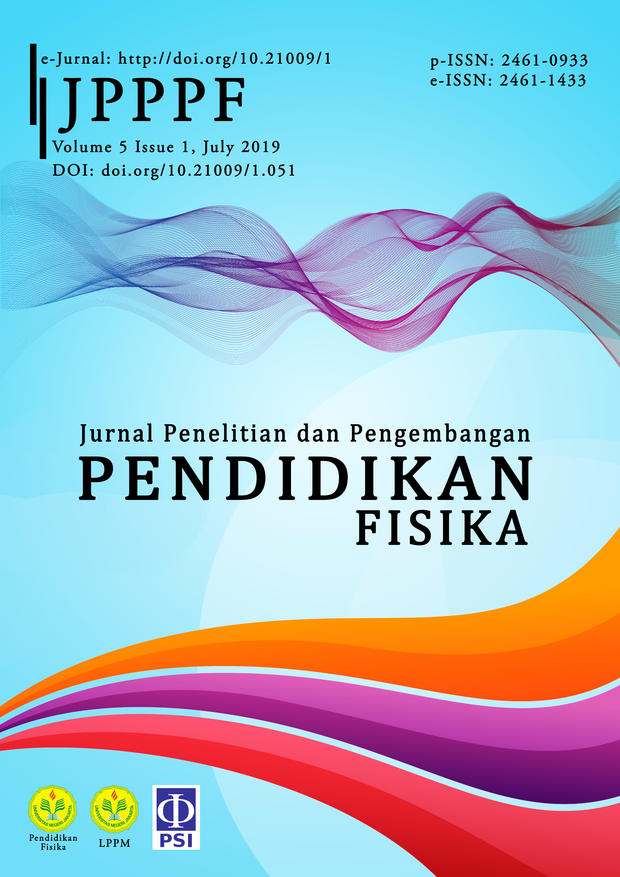Inquiry-Based Learning for Improving Student Learning Outcomes: Literature Review
DOI:
https://doi.org/10.21009/1.05106Keywords:
inquiry-based learning, learning outcome, literature reviewAbstract
The learning process has entered the 21st century and shifted from Teacher Center Learning (TCL) to Student Center Learning (SCL). Therefore, to improve student learning achievement and activity, innovative learning models are needed to provide more active learning opportunities for students in the learning process. There are a number of innovative learning models, one of which can improve student achievement and activity is inquiry-based learning. It would be better for students to discuss lessons or try to learn the material first, then present the results in front of the class and discuss with other students. Thus, the learning process becomes more active and dynamic with the guidance and direction of the lecturer. This literature review aims to determine the influence of the application of inquiry learning in improving student learning outcomes. The design used is a literature review, articles are collected using the database proquest, google scholar and Science Direct with the keywords “inquiry based learning model” AND “learning outcomes”. The criteria for the articles used are those published in 2014-2018. Based on thirteen articles collected, the results showed that ten articles showed that inquiry learning improved student learning outcomes while the other three did not influence student learning outcomes, but could increase learning motivation. The inquiry-based learning involves students directly and actively in the learning process so that learning has a significant effect on improving learning outcomes.
References
Anstey, L.M., 2017. “Applying anatomy to something I care about”: Authentic inquiry learning and student experiences of an inquiry project. Anat. Sci. Educ. 10, 538–548. https://doi.org/10.1002/ase.1690
Biru, L.T., Prasetyaningsih, P., Vitasari, M., Resti, V.D.A., Suryani, D.I., 2018. The Implementation of Pedagogical Content Knowledge (PCK) based Guided Inquiry on Science Teacher Students. J. Penelit. Dan Pembelajaran IPA 4, 76. https://doi.org/10.30870/jppi.v4i1.3315
Brown, D., Chronister, C., 2009. The Effect of Simulation Learning on Critical Thinking and Self-confidence When Incorporated Into an Electrocardiogram Nursing Course. Clin. Simul. Nurs. 5, e45–e52. https://doi.org/10.1016/j.ecns.2008.11.001
Chang, C., Chang, C.-K., Shih, J.-L., 2016. Motivational strategies in a mobile inquiry-based language learning setting. System 59, 100–115. https://doi.org/10.1016/j.system.2016.04.013
Cheng, P.-H., Yang, Y.-T.C., Chang, S.-H.G., Kuo, F.-R.R., 2016. 5E Mobile Inquiry Learning Approach for Enhancing Learning Motivation and Scientific Inquiry Ability of University Students. IEEE Trans. Educ. 59, 147–153. https://doi.org/10.1109/TE.2015.2467352
Hartini, I., 2016. Keefektifan Pembelajaran Inkuiri dan Problem-Based Learning terhadap Hasil Belajar Siswa Pada Mata Pelajaran Ilmu Pengetahuan Alam 8.
Hsu, L., 2014. An epistemological analysis of the application of an online inquiry-based program in tourism education. Australas. J. Educ. Technol. 30. https://doi.org/10.14742/ajet.402
Inche,E and Acar,Y.,2016. Analysis Of The Effect Of Prediction-Observation-Explanation And Inquiry-Based Learning Methods On Scientific Process Skills And Critical Thinking Disposition Of Preservice Science Teachers In General Physics Laboratory.
Istikomayanti, Y., Si, S., 2015. Penerapan Strategi Inkuiri Dan Problem Based Learning (Pbl) Untuk Meningkatkan Pemahaman Konsep Dan Keterampilan Proses Pada Mata Kuliah Ekologi Tumbuhan Berbasis Ptk-Ls 7.
Kocagül, M. 2013. Effects of Inquiry Professional Development Activities on Scientific Process Skills of Primary School Science and Technology Teachers, Self-Efficacy and Beliefs on Inquiry-Based Learning. Dokuz Eylül University Institute of Educational Sciences, İzmir.
National Research Council, 2000. Inquiry and the National Science Education Standards. Washington, DC: National Academy Press
Nybo, L., May, M., 2015. Effectiveness of inquiry-based learning in an undergraduate exercise physiology course. Adv. Physiol. Educ. 39, 76–80. https://doi.org/10.1152/advan.00161.2014
Putra, H.D., Purwasih, R., 2015. Meningkatkan Prestasi Belajar Dan Keaktifan Mahasiswa Melalui Project Based Learning 2, 9.
Sari, N., 2015. Penggunaan Model Inquiry Learning Untuk Meningkatkan Hasil Belajar Siswa 13.
Smallhorn, M., Young, J., Hunter, N., Burke da Silva, K., 2015. Inquiry-based learning to improve student engagement in a large first year topic. Stud. Success 6. https://doi.org/10.5204/ssj.v6i2.292
Triyana,E.,2017.Efektifitas Model Pembelajaran Guided Inquiry Dan Model Problem Based Learning (PBL) Terhadap Kemampuan Pemecahan Masalah Pada Mata Pelajaran Matematika.
Ural, E., 2016. The Effect of Guided-Inquiry Laboratory Experiments on Science Education Students’ Chemistry Laboratory Attitudes, Anxiety and Achievement. J. Educ. Train. Stud. 4. https://doi.org/10.11114/jets.v4i4.1395
Wang, H.-Y., Duh, H.B.-L., Li, N., Lin, T.-J., Tsai, C.-C., 2014. An Investigation of University Students’ Collaborative Inquiry Learning Behaviors in an Augmented Reality Simulation and a Traditional Simulation. J. Sci. Educ. Technol. 23, 682–691. https://doi.org/10.1007/s10956-014-9494-8
Wu,J.W.,Tseng,J.C.R,& Hwang,G.J.,2015. Development Of An Inquiry-Based Learning Support System Based On An Inteligent Knowledge Exploration Approach.Educational Tecnology&Society,18(3),282-300
Yildirim, N., Kurt, S., Güneş, L., 2014. Effects Of Inquiry Based Learning Activities On Scientific Process Skills And Academic ACHIEVEMENT OF PRESERVICE CLASSROOM TEACHERS. Int. J. Acad. Res. 6, 9.
Yunistika, R., Juanengsih, N., 2018. Enhancing Students’ Higher-Order Thinking Skills Through Guided and Free Inquiry-Based Learning 115, 4.











